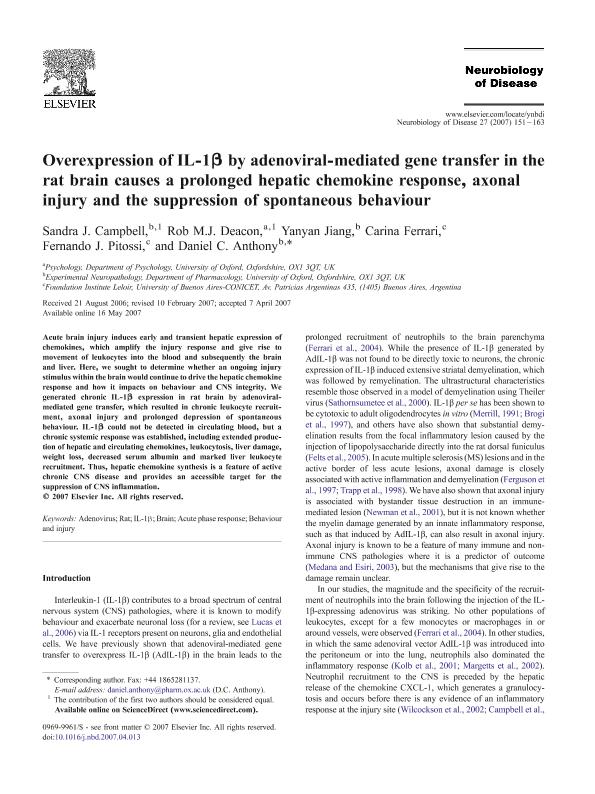Artículo
Overexpression of IL-1beta by adenoviral-mediated gene transfer in the rat brain causes a prolonged hepatic chemokine response, axonal injury and the suppression of spontaneous behaviour
Campbell, Sandra J.; Deacon, Rob M.J.; Jiang, Yanian; Ferrari, Carina Cintia ; Pitossi, Fernando Juan
; Pitossi, Fernando Juan ; Anthony, Daniel C.
; Anthony, Daniel C.
 ; Pitossi, Fernando Juan
; Pitossi, Fernando Juan ; Anthony, Daniel C.
; Anthony, Daniel C.
Fecha de publicación:
05/2007
Editorial:
Academic Press
Revista:
Neurobiology of Disease
ISSN:
0969-9961
e-ISSN:
1095-953X
Idioma:
Inglés
Tipo de recurso:
Artículo publicado
Clasificación temática:
Resumen
Acute brain injury induces early and transient hepatic expression of chemokines, which amplify the injury response and give rise to movement of leukocytes into the blood and subsequently the brain and liver. Here, we sought to determine whether an ongoing injury stimulus within the brain would continue to drive the hepatic chemokine response and how it impacts on behaviour and CNS integrity. We generated chronic IL-1beta expression in rat brain by adenoviral-mediated gene transfer, which resulted in chronic leukocyte recruitment, axonal injury and prolonged depression of spontaneous behaviour. IL-1beta could not be detected in circulating blood, but a chronic systemic response was established, including extended production of hepatic and circulating chemokines, leukocytosis, liver damage, weight loss, decreased serum albumin and marked liver leukocyte recruitment. Thus, hepatic chemokine synthesis is a feature of active chronic CNS disease and provides an accessible target for the suppression of CNS inflammation
Palabras clave:
Adenovirus
,
Rat
,
Il-1beta
,
Brain
Archivos asociados
Licencia
Identificadores
Colecciones
Articulos(IIBBA)
Articulos de INST.DE INVEST.BIOQUIMICAS DE BS.AS(I)
Articulos de INST.DE INVEST.BIOQUIMICAS DE BS.AS(I)
Citación
Campbell, Sandra J.; Deacon, Rob M.J.; Jiang, Yanian; Ferrari, Carina Cintia; Pitossi, Fernando Juan; et al.; Overexpression of IL-1beta by adenoviral-mediated gene transfer in the rat brain causes a prolonged hepatic chemokine response, axonal injury and the suppression of spontaneous behaviour; Academic Press; Neurobiology of Disease; 27; 2; 5-2007; 151-163
Compartir
Altmétricas



